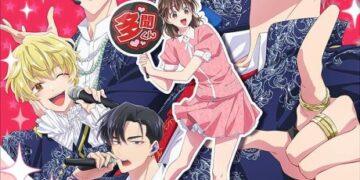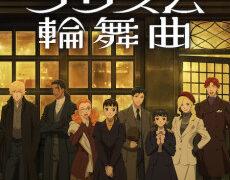How Thunderbolt Fantasy Brought a New Legacy of Puppetry Around the World
Since its debut in 2016, Thunderbolt Fantasy has captivated international audiences by blending traditional Taiwanese glove puppetry with modern storytelling. This unique production, created in part by acclaimed anime screenwriter Gen Urobuchi, brought a centuries-old art form into the contemporary spotlight. Over nearly a decade, fans followed the adventures of characters like Shāng Bù Huàn and Lǐn Xuě Yā across a beautifully crafted narrative arc that concluded with the release of Thunderbolt Fantasy Sword Seekers -The Finale- in February 2024 in Japan.
Produced by PILI International Multimedia, the Taiwanese studio known for its deep cultural roots and technical expertise in puppetry, Thunderbolt Fantasy has significantly expanded the studio’s global reach. This rising interest has been strengthened through strategic international collaborations, notably with Urobuchi and platforms such as Crunchyroll, which streamed the series globally to anime and fantasy fans alike.
The Origins and Legacy of Thunderbolt Fantasy
PILI International Multimedia has been a household name in Taiwan for generations, preserving and evolving traditional glove puppetry. According to Jen-Jia Huang, the Chief Brand Officer at PILI and part of the fifth generation managing the company, Thunderbolt Fantasy was an ambitious project that sought to blend cultural heritage with modern visual storytelling. Huang has been involved with the brand since its inception and played a vital role in bringing the franchise to an international audience through marketing and branding strategy.
The project was enhanced by the involvement of writer Gen Urobuchi (known for titles such as Puella Magi Madoka Magica and Psycho-Pass), who served as a scriptwriter and creative consultant. His vision and enthusiasm for puppetry played a key role in bridging the gap between classical performance and modern narrative structures, earning praise for his disciplined and collaborative approach to the production.
The Unique Value of Puppetry in Modern Media
Thunderbolt Fantasy redefined how puppetry is perceived in the global entertainment landscape. According to Osmond, a young puppeteer at PILI, puppetry offers unique lighting and practical effects not often seen in anime or CG animation. He emphasized how puppets take on lifelike characteristics when handled with skill, impressing viewers with their expressiveness, especially during promotional events and live demonstrations.
Huang noted that the lack of facial expressions in puppets actually enhances viewer engagement. Because the emotions are conveyed through subtle gestures and viewer interpretation, fans form a deeper personal connection to the characters—a quality that differentiates puppetry from other visual media like cartoons.
Global Expansion and Reception
While puppetry is a daily part of mainstream television in Taiwan, the reception outside the country has been much more surprising and enthusiastic. The international debut, which included dramatic action sequences and intricate storytelling, became a viral sensation among global anime fans. Viewers were particularly impressed by how complex action scenes—such as head-exploding encounters and magical duels—were executed using puppetry techniques.
This broad appeal contributed to Thunderbolt Fantasy’s international success. The series was streamed globally via platforms like Crunchyroll, bringing PILI’s art to new demographics. According to Huang, fan engagement on PILI’s English-language social channels significantly increased, and some international fans even traveled to Taiwan to visit the studio in person.
Collaborating with Gen Urobuchi
Gen Urobuchi played an integral role throughout the production of Thunderbolt Fantasy. Huang commended his strong work ethic, creativity, and consistent involvement in the storyline and overall project vision. Urobuchi also voiced a character in the final season—a boat master puppet modeled after himself using 3D printing, showcasing his deeper connection and playful involvement with the production.
The voice cast of the series includes top-level talent from both Japan and Taiwan, though the final episodes also featured AI-generated voices from legacy voice actors, demonstrating innovation in preserving character identity while honoring the contributions of past performers.
Inspirations and Cross-Media Influences
Though rooted in traditional storytelling, the Thunderbolt Fantasy team often looked to other forms of media for inspiration, including anime and Hollywood cinema. Huang noted that their CEO proactively encouraged staff to engage with international media for creative purposes. References from iconic anime like JoJo’s Bizarre Adventure and Demon Slayer: Kimetsu no Yaiba can be seen in character poses and choreographed action scenes within the series.
Expanding the Reach of Traditional Puppetry
Thunderbolt Fantasy’s success has opened new doors for PILI International Multimedia. Huang revealed ambitions for further collaborations with international creators and studios, building on the model that made Thunderbolt Fantasy globally accessible. These efforts aim to cultivate broader recognition for Taiwanese puppetry in the modern entertainment landscape.
Osmond also expressed excitement about using public events and conventions as a way to introduce more people to the potential of puppetry. His involvement in promotional activities, including cosplay, highlights a multidimensional approach to bridging traditional art with modern fandom culture.
Looking Ahead for PILI International Multimedia
With Thunderbolt Fantasy reaching its narrative conclusion, PILI is eager to build on its success. The studio aims to internationalize its brand further, while continuing collaborations with talented creators like Urobuchi. The team is also exploring new production techniques and promotional strategies to keep puppetry relevant in the digital era.
The studio’s past production of the Legend of the Sacred Stone, now over 25 years old, continues to attract attention from new and longtime viewers alike. Featured characters such as Su Huan-Jen have remained iconic, even appearing in the final season of Thunderbolt Fantasy in a powerful crossover moment enhanced by AI voice recreation technology.
A Thank You to the Fans
As the curtain falls on the Thunderbolt Fantasy saga, both Huang and Osmond expressed deep gratitude to international viewers for embracing their work. They encouraged fans to continue spreading awareness of puppetry and to explore more of PILI’s offerings, hoping to one day meet global supporters in person at events and exhibitions.
Thunderbolt Fantasy has proven not only to be a landmark series in international storytelling but also a shining example of how blending traditional art forms with modern media can result in something truly unforgettable. Through innovation, collaboration, and cultural passion, Thunderbolt Fantasy has created a new global legacy for Taiwanese puppetry.











